Second time lucky for Hillary Clinton?
- Published
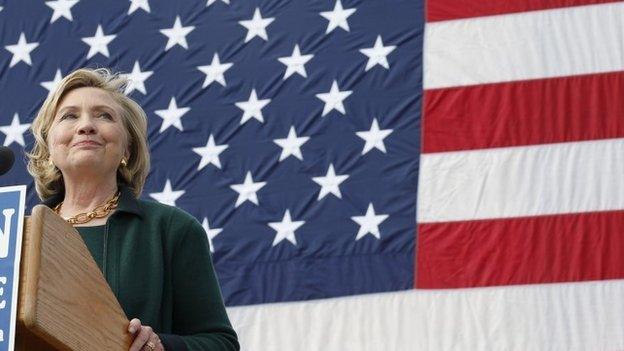
Hillary Clinton has served many roles in US politics - first lady, senator, secretary of state. Now, she turns for a second time to her long-held ambition to fill the ultimate role - US president.
The 68-year-old Democrat served as President Barack Obama's secretary of state from the start of his administration in January 2009, stepping down shortly after he won re-election.
As top US diplomat, she was known for a punishing travel schedule and a person-to-person approach to diplomacy.
That kind of regime will prepare her well for the frenetic weeks ahead, as the Democratic party's standard-bearer hoping to go all the way after losing a bruising 2008 primary to Mr Obama.

How it all started for Hillary Clinton
Hillary Rodham Clinton
Born 26 October, 1947 in Chicago
Graduated from Yale Law School in 1973
Married Bill Clinton in 1975
1993-2001: Campaigned for expanding health insurance and women's rights as first lady
Elected New York senator in 2000
Re-elected by wide margin in 2006
2008: Failed bid for Democratic Party presidential nomination
2009-2013: Secretary of State

Hillary Diane Rodham was born in October 1947 in Chicago. In the 1960s she attended Wellesley College in Massachusetts, and became active in student politics.
She went on to Yale Law School, where she met Bill Clinton. They married in 1975. She remained politically active after Mr Clinton became governor of Arkansas in 1978.
When Mr Clinton campaigned for the presidency in 1992, he quipped he was offering voters two presidents "for the price of one".
As first lady, Mrs Clinton campaigned for women's rights and universal healthcare, raising her profile both at home and internationally.
However, following her failure to deliver on a plan for universal health coverage - which was never even debated in Congress - many critics saw her as overambitious and politically naive.
From the mid-1990s - and throughout during Bill Clinton's second term - she became involved in the various scandals that marred his presidency.
There were congressional hearings and an investigation into the Whitewater affair, a failed real estate project in which the Clintons had invested.
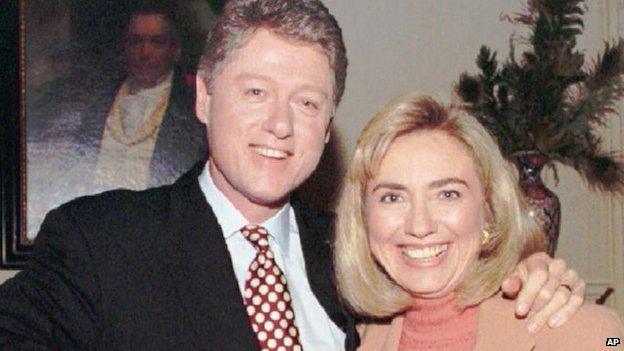
Hillary Rodham Clinton first came to prominence as first lady
They were cleared of wrongdoing.
She also endured media attention over Mr Clinton's affairs - notably his relationship with White House intern Monica Lewinsky, which came to light in 1998.
Hillary Rodham Clinton developed a tough hide that helped her weather the personal and political turmoil.
She lashed out at her husband's critics, declaring in a 1998 interview that the Lewinsky scandal - which led to impeachment proceedings - was inspired by a "vast right-wing conspiracy".
In 2000, as the Clinton presidency was drawing to a close, she successfully ran for senator in New York State, positioning herself in the centre of the Democratic Party.
She voted for the invasion of Iraq in 2003 but distanced herself from the conduct of the conflict, and called for the withdrawal of US troops. She easily won re-election as a senator in 2006.
Presidential run
In 2008 she sought the Democratic nomination for the presidential election. However critics - including within her own party - saw her as a divisive figure for whom many Americans would never vote.
In the end, Barack Obama secured the nomination and went on to win the general election.
He named her as his secretary of state in an attempt to heal the rift within the Democratic party caused by a bruising primary campaign.
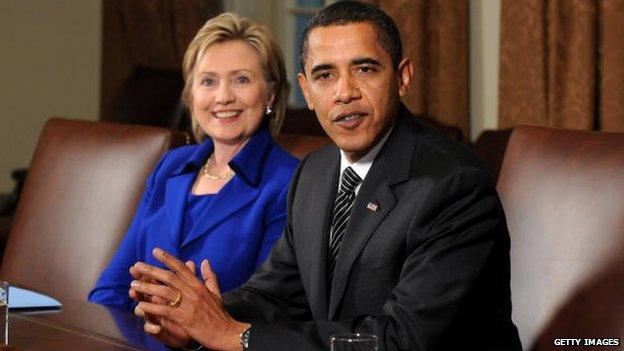
Mrs Clinton agreed to serve in Barack Obama's 'team of rivals'
During her four-year tenure, Mrs Clinton visited 112 countries - more than any previous secretary of state.
Mrs Clinton used her position to highlight women's rights and human rights. She also led the US response to the Arab Spring and the military intervention in Libya in 2011.
The state department came in for sustained criticism after an attack on a diplomatic compound in Benghazi in September 2012, in which the US ambassador was among those killed.
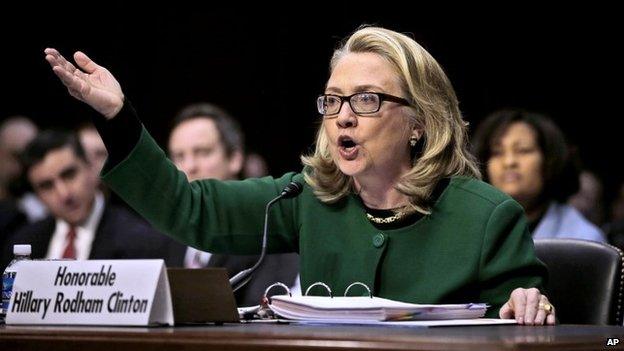
In a tense congressional hearing and one of her last public appearances as secretary, Mrs Clinton said she took responsibility for security failures at the outpost, but said she had not seen requests for more security beforehand.
She returned to Congress to testify about the attack in October 2015. Despite answering questions for more than 11 hours in front of a special committee, the hearing yielded little new information.
After leaving the state department, Mrs Clinton continued to make public appearances and speeches on a limited schedule, ramping up for the publication for her second memoir, Hard Choices, which described her time as secretary of state.
Shortly before Mrs Clinton's announcement of her candidacy, there were accusations that she may have breached federal rules during her time as secretary of state by using a private email account for official business, including potential sensitive information.
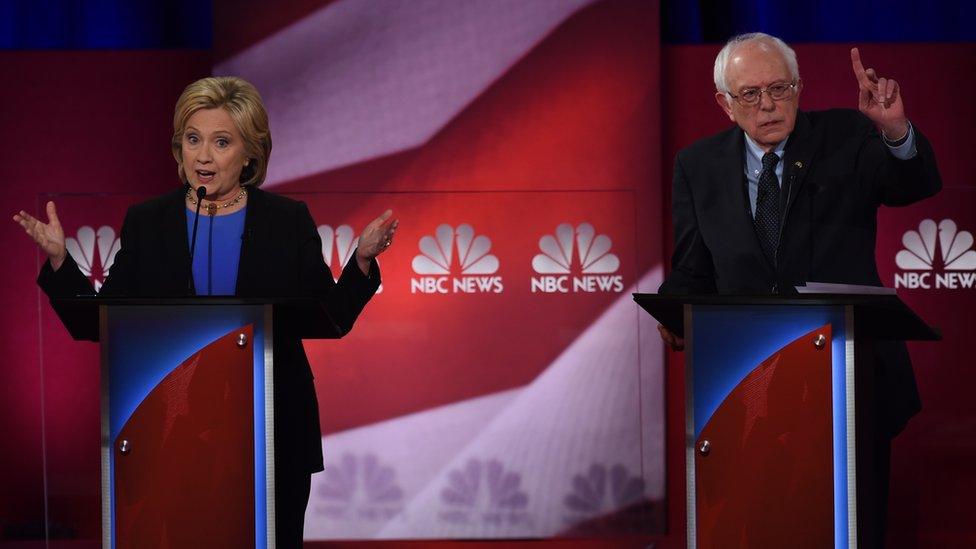
Hillary Clinton debates fellow Democratic candidate Senator Bernie Sanders
The FBI announced it would not recommend criminal charges against Mrs Clinton, but said she and her staff "were extremely careless in their handling of very sensitive, highly classified information".
Legal uncertainty over the email controversy has marred Mrs Clinton's primary and presidential campaigns, with polls suggesting that voters remain sceptical about how much they trust her.
Vermont Senator Bernie Sanders mounted a stronger primary challenge than many had expected. But Mrs Clinton eventually won with something to spare, dominating in the South.
She enjoyed a bump in the polls after her party convention speech, becoming the first female nominee for a major US political party.
But the contest has tightened since, and the low point of her campaign came in September when she was widely condemned for describing half of Trump's supporters as "deplorables".
A day later, she was taken ill at a 9/11 memorial service and her campaign announced she was suffering from pneumonia. As she returns to the campaign trail, with the long-awaited first debate days away, she has lost ground to make up.